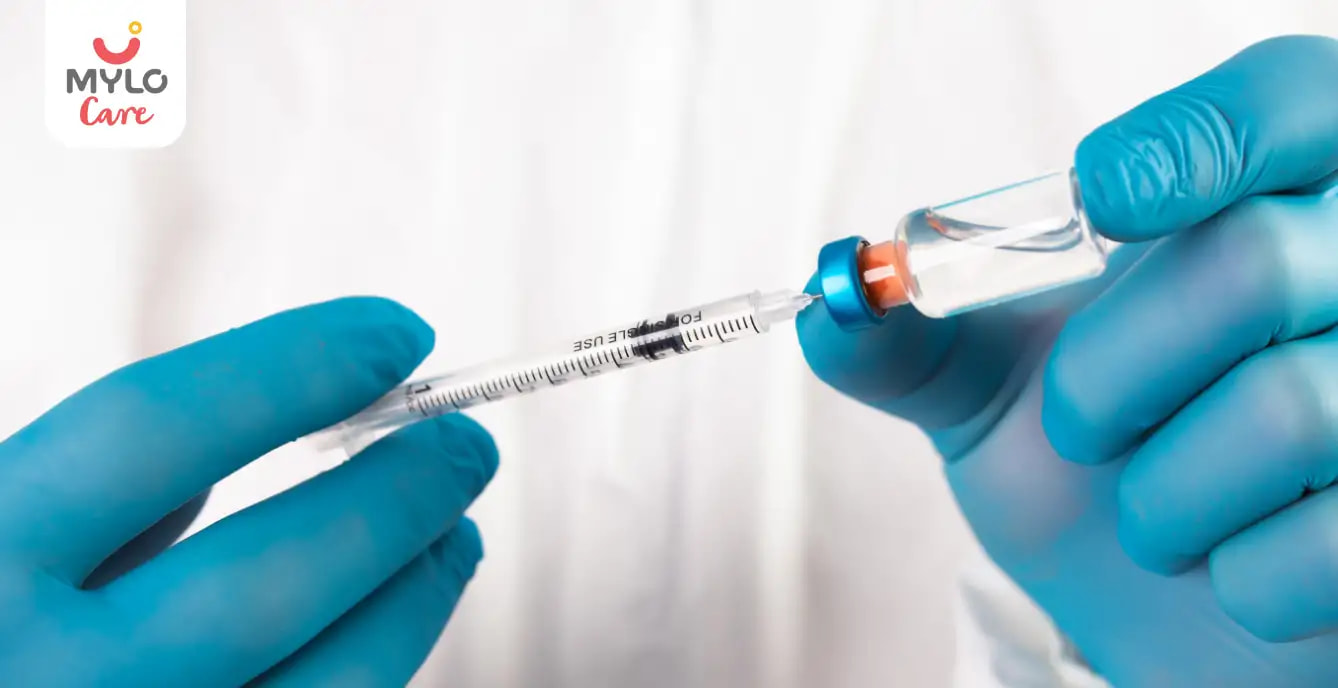Home

Lupride Injection: How It Works and What You Need to Know
In this Article

Hormones
Lupride Injection: How It Works and What You Need to Know
Updated on 27 February 2024
Have you been struggling with some hormonal imbalances and the doctor recommended you some shots of Lupride injection? Well, if you are clueless about what this injection means, its uses and most importantly, if it has any side effects, then you’re at the right place. In this article, we will dive into the nitty-gritty of Lupride injections – how they work, what they're used for, and everything else you need to know.
What is Lupride Depot?
Lupride Depot, also known as Lupride injection, is a medication widely used in the field of reproductive medicine. It belongs to a class of drugs called GnRH agonists, which stands for Gonadotropin-releasing hormone agonists. It is specifically designed to suppress the production of certain hormones in the body. This medication comes in the form of an injection and is administered either subcutaneously or intramuscularly.
Lupride Injection Uses
Inj lupride has a range of uses in different medical conditions. Let's explore some of the common conditions where it is prescribed:
1. Endometriosis
Lupride is often used to manage symptoms associated with endometriosis. It works by reducing the production of estrogen, which helps alleviate pain and decrease the growth of endometrial tissue outside the uterus.
2. Uterine Fibroids
It can be used to treat uterine fibroids, noncancerous growths in the uterus. It helps shrink the fibroids and reduce symptoms such as heavy menstrual bleeding and pelvic pressure.
3. Precocious Puberty
In some cases, children may experience early onset of puberty. Lupride can be administered to delay further development, allowing the child to grow at a normal pace.
4. Prostate Cancer
Lupride depot is used in the treatment of advanced prostate cancer. By suppressing the production of testosterone, it helps slow down the growth of cancer cells and manage the symptoms associated with the disease.
5. Breast Cancer
In certain cases of breast cancer, Lupride may be prescribed to suppress the production of estrogen. This can be effective in treating hormone receptor-positive breast cancer.
6. Infertility
Lupride plays a crucial role in the field of assisted reproductive technologies, such as IVF. It helps regulate the timing of egg retrieval and prevents premature ovulation.
Lupride Injection Uses in IVF
In the context of in vitro fertilization (IVF), Lupride injections, also known as leuprolide acetate, are used for several purposes to optimize the chances of a successful IVF cycle, including:
1. Ovarian Stimulation Suppression
Lupride is used to suppress the natural hormonal fluctuations that could interfere with the controlled ovarian stimulation process in IVF. By creating a temporary "down regulation" of the pituitary gland, it helps to prevent premature ovulation and allows for better control over the timing of egg retrieval.
2. Synchronization of Follicular Development
These injections aid in synchronizing the development of multiple follicles in the ovaries, which is essential for a successful IVF cycle. This synchronization allows for a more predictable and coordinated approach to egg retrieval.
3. Endometrial Preparation
Doctors may also recommend lupride injection before embryo transfer to prepare the endometrium by creating a more favorable environment for embryo implantation.
4. Treatment of Endometriosis
In some cases, Lupride may be used to treat endometriosis in women undergoing IVF. By reducing the growth of endometrial tissue outside the uterus, Lupride can improve the chances of successful embryo implantation.
5. Management of Polycystic Ovary Syndrome (PCOS)
Lupride may be used to manage the symptoms of PCOS in women undergoing IVF. By regulating hormone levels and reducing the risk of ovarian hyperstimulation syndrome, Lupride can improve the outcomes of IVF treatment for women with PCOS.
6. Improving Egg Quality
Lupride injections may help to improve the quality of eggs retrieved during IVF by promoting a more uniform and controlled growth of ovarian follicles.
How is Inj Lupride Administered?
Lupride injection is typically administered either subcutaneously (under the skin) or intramuscularly (into the muscle). The exact method of administration may vary depending on the specific medical condition being treated.
Before administering the injection, the healthcare provider will clean the injection site and use a sterile needle to minimize the risk of infection. It should be injected slowly and steadily to ensure proper absorption.
It is crucial to follow the prescribed dosage and schedule recommended by your healthcare provider. It is generally self-administered, but it is important to receive proper training and guidance from a healthcare professional to ensure correct administration.
Side Effects of Lupride Injection
As with any medication, Lupride depot may cause some side effects. While not everyone experiences these side effects, it is essential to be aware of potential reactions. Here are five common side effects associated with it:
1. Hot Flashes
One of the most common side effects is hot flashes, a sudden feeling of warmth and flushing of the skin. These hot flashes can be mild to severe and may occur frequently.
2. Headaches
Some individuals may experience headaches or migraines while taking this injection. These headaches can range from mild discomfort to intense pain.
3. Mood Swings
Lupride may affect hormone levels, leading to mood swings and emotional changes. Some individuals may experience irritability, anxiety, or depression.
4. Fatigue
Feeling tired or fatigued is another possible side effect of this injection. This fatigue may be mild or more pronounced, depending on the individual.
5. Bone Density Loss
Long-term use of this injection may lead to a decrease in bone density. This can increase the risk of osteoporosis and bone fractures, especially in postmenopausal women.
It is important to discuss any side effects you experience with your healthcare provider. They can provide guidance on managing these side effects or adjust your treatment plan if necessary.
Precautions to Follow When Taking Lupride Depot
While Lupride can be an effective medication, it is important to take certain precautions to ensure its safe and proper use, including:
1. Pregnancy and Breastfeeding
Lupride Depot is not recommended during pregnancy as it may harm the developing fetus. It is also not suitable for use while breastfeeding, as it may pass into breast milk.
2. Allergies
Inform your healthcare provider of any known allergies or sensitivities you have. It is important to check the ingredients of Lupride Depot to avoid any allergic reactions.
3. Medical Conditions
Discuss any existing medical conditions with your healthcare provider before starting Lupride Depot. Conditions such as liver disease, kidney disease, or a history of depression may require special consideration.
4. Interactions with other Medications
Some medications may interact with Lupride and affect its effectiveness or increase the risk of side effects. Inform your healthcare provider about any medications, including over-the-counter drugs and supplements, that you are taking.
5. Follow Dosage Instructions
It is crucial to follow the prescribed dosage and schedule recommended by your healthcare provider. Do not adjust the dosage without consulting your healthcare provider first.
By following these precautions, you can help ensure the safe and effective use of Lupride Depot.
The Bottomline
Lupride injection, or Lupride Depot, is a medication with versatile uses in the field of reproductive medicine and beyond. It is commonly prescribed to treat conditions such as endometriosis, uterine fibroids, and as part of IVF treatments. While it can be an effective medication, it is important to be aware of the potential side effects and precautions associated with its use. If you have been prescribed Lupride injection or are considering it as part of your treatment plan, it is crucial to consult with your healthcare provider.
References
1. Swayzer DV, Gerriets V. Leuprolide. (2023). In: StatPearls [Internet]. Treasure Island (FL): StatPearls Publishing
2. Inamdar DB, Majumdar A. (2012). Evaluation of the impact of gonadotropin-releasing hormone agonist as an adjuvant in luteal-phase support on IVF outcome. J Hum Reprod Sci.



Written by
Anupama Chadha
Anupama Chadha, born and raised in Delhi is a content writer who has written extensively for industries such as HR, Healthcare, Finance, Retail and Tech.
Read MoreGet baby's diet chart, and growth tips

Related Articles
Related Questions
Hello frnds..still no pain...doctor said head fix nhi hua hai..bt vagina me pain hai aur back pain bhi... anyone having same issues??

Kon kon c chije aisi hai jo pregnancy mei gas acidity jalan karti hain... Koi btayega plz bcz mujhe aksar khane ke baad hi samagh aata hai ki is chij se gas acidity jalan ho gyi hai. Please share your knowledge

I am 13 week pregnancy. Anyone having Storione-xt tablet. It better to have morning or night ???

Hlo to be moms....i hv a query...in my 9.5 wk i feel body joint pain like in ankle, knee, wrist, shoulder, toes....pain intensity is high...i cnt sleep....what should i do pls help....cn i cosult my doc.

Influenza and boostrix injection kisiko laga hai kya 8 month pregnancy me and q lagta hai ye plz reply me

Related Topics
RECENTLY PUBLISHED ARTICLES
our most recent articles

Hormones
Why are Some Women Recommended HCG Injection During Pregnancy?
Sudden Infant Death Syndrome
Sudden Infant Death Syndrome (SIDS): Meaning, Causes & Prevention

Periods
Period After Abortion: What to Expect About Timing, Duration and Frequency
Daily Care Tips
Thumb Sucking: How to Help Your Child Break the Habit

Women Specific Issues
The Ultimate Guide on How to Shrink Ovarian Cysts Naturally

Conception
Ashwagandha Benefits for Female & Male Fertility: How This Ancient Herb Can Help You Conceive
- What are the 12 things that parents can do with their baby in the first 12 months?
- The Lowdown on Cetirizine in Pregnancy: A Must-Read for Expecting Moms
- The Ultimate Collection of Paheliyan with Answer for Kids
- The Ultimate Guide to Abdominal Pain After Abortion Causes and Care
- Ovulation Kit 101: A Beginner's Guide to Tracking Fertility & Maximizing Your Chances of Conception
- Is Breast Pain after Abortion Normal? What You Need to Know
- Twin Pregnancy: Signs, Types & Risks
- Chasteberry Benefits: The Natural Remedy You Need for Infertility, Hormonal Imbalance, and PMS
- The Ultimate Guide to Planning the Perfect Baby Shower
- 50+ New Born Baby Wishes to Congratulate New Parents
- First Period After C Section: How Long Does It Last
- Introducing Solid Foods to your 6-month-old Baby? Here is a complete Food Chart along with some Nutritious Recipes
- What to expect about the height/length of 6 months old?
- The Development of Your Kid at the Age of Four Months


AWARDS AND RECOGNITION

Mylo wins Forbes D2C Disruptor award

Mylo wins The Economic Times Promising Brands 2022
AS SEEN IN
















- Mylo Care: Effective and science-backed personal care and wellness solutions for a joyful you.
- Mylo Baby: Science-backed, gentle and effective personal care & hygiene range for your little one.
- Mylo Community: Trusted and empathetic community of 10mn+ parents and experts.
Product Categories
baby carrier | baby soap | baby wipes | stretch marks cream | baby cream | baby shampoo | baby massage oil | baby hair oil | stretch marks oil | baby body wash | baby powder | baby lotion | diaper rash cream | newborn diapers | teether | baby kajal | baby diapers | cloth diapers |




